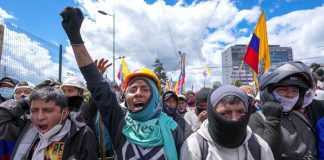Angela Merkel’s conservative CDU party was re-elected in the recent German elections—but the main outcome was polarisation to the left and right. Among the major beneficiaries was Die Linke—the young radical left party which has grown as a result of the rightward shift of the equivalent of the Labor party, the SPD.
The “grand coalition” government which the SPD entered with Merkel’s conservatives will now end, with Merkel forging a new partnership with the FDP.
The FDP is a party that stands for cuts in taxes on the rich and slashing public spending.
Bosses were quick to greet Merkel’s victory as a chance to implement the pro-business agenda they crave.
“German politics now has a chance for a clear profile, especially in the field of sound, market-orientated policies,” said Wolfgang Kirsch, head of Germany’s DZ bank.
But the results do not indicate a shift to the right amongst German voters, says Stefan Bornost, editor of German magazine Marx21.
“The total vote for the centre right parties rose by just 3.4 per cent, while the total vote for the left fell by 5.4 per cent,” he commented.
“There was a significant redistribution of the vote among the right wing parties—in particular the CDU lost votes to the FDP—but this does not a reflect a general thirst for pro-market policies.”
In fact, says Stefan, recent social attitudes surveys show the opposite is true.
“Around 59 per cent of Germans think there should be more social solidarity, compared to 31 per cent who think there should be more competition.”
That feeling was reflected in the votes for the radical left.
While the SPD saw its vote collapse to just 23 per cent—its worst election result since 1953—the results for Die Linke, its new left wing challenger, were very encouraging.
Die Linke took 11.9 per cent of the vote, up 3.2 percentage points on the previous general election, and won 76 MPs—22 more than last time around.
It overtook the Greens, who also had a record-beating election.
“Fear of the reaction to cuts is already making it difficult for the new government,” says Stefan.
“On the day the results were announced, Merkel was forced to say she will stand for ‘social needs’—despite the fact that bosses are baying for cuts.
“Nevertheless, there are going to be big battles ahead.”
Faced with a reduction of tax revenues of up to 20 per cent, the government is preparing to order cuts in public expenditure across the board.
Die Linke’s campaign
Die Linke fought its election campaign on core issues—the immediate implementation of a minimum wage, taxing the rich, troops out of Afghanistan, repeal of the harsh unemployment benefit laws, and no to raising the retirement age to 67.
The election saw Die Linke rise to being the biggest party in most states in the former East Germany.
Two members of the revolutionary socialist Marx21 network inside Die Linke, Christine Bucholz and Nicole Gohlke, won seats as MPs in the election.
Party leader Oskar Lafontaine says the key tasks ahead include joining governments in order to block federal legislation, winning future elections, and taking to the streets to protest against cuts.
However, joining governing coalitions at a time of budget cuts would almost certainly mean implementing policies that hit the party’s working class supporters, says Stefan.
“You cannot say that a vote for Die Linke is one that will defend public services, while at the same time making cuts,” he says.
“But the pressure to take office is great. The revulsion with the CDU is such that the vast majority of Die Linke’s voters say they want our party in government.”
Other key questions for Die Linke will be how it responds to the economic crisis, and how it relates to millions of disillusioned working class SPD supporters.
“We need to forge a united front to fight back against the attacks that are coming,” says Stefan.
“That doesn’t mean letting the SPD leaders off the hook, but it does mean organising to fight against the bosses and the Tories alongside their rank and file.”
By Yuri Prasad
Socialist Worker UK
http://www.socialistworker.co.uk/art.php?id=19128





